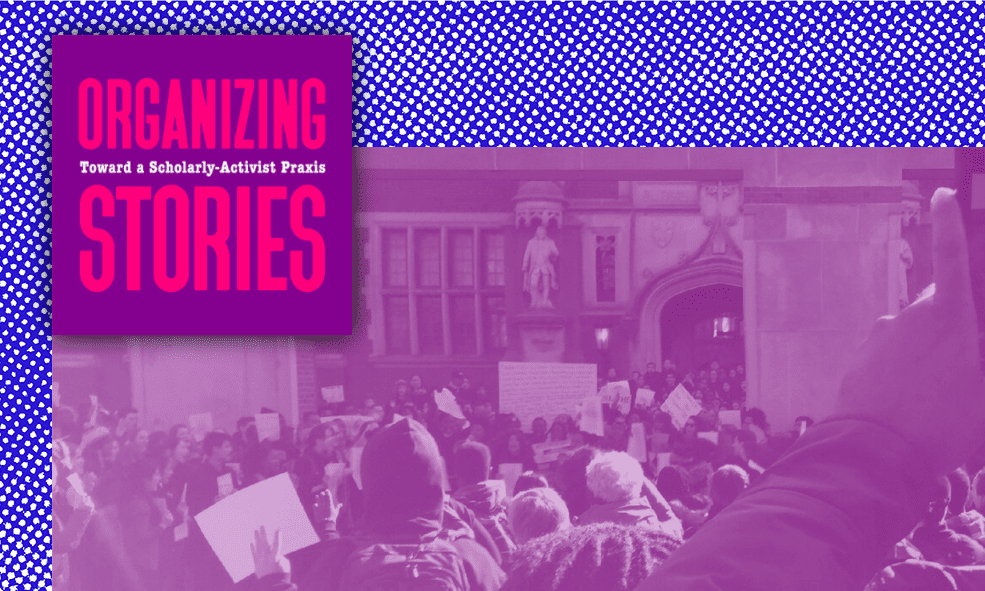By Catie Crandell
Organizing Stories, a new project that builds on a tradition of joining scholarly work with movement work to achieve a scholarly-activist praxis, has begun its work in fostering conversation between Princeton students and community-based social justice workers. Founded and directed by Professors Monica Huerta (English and American Studies) and Autumn Womack (English and African American Studies), Organizing Stories focuses on the powerful role that storytelling plays in organizing work. Its overarching goal is to connect students with organizers through a shared intellectual investment in the multi-dimensional and multi-disciplinary modes through which storytelling and movements toward justice intermingle and by which justice gains ever new and ever-expanding vantages and horizons.
The first workshop, which took place on October 21, hosted Reverend Liz Theoharis, Co-chair of the Poor People’s Campaign and director of the Kairos Center. Theoharis began her talk with the powerful statement that “movements begin with the telling of untold stories.” As Theoharis explained, her own story in organizing began when her parents included her in their activism when she was just a kid: “I had a Winnie the Pooh bag with a bouncy ball and coloring markers that I would bring to activist events and church events” she explained. Since her childhood, Theoharis has remained steeped in the activist community and continues to bring attention to “the fissures of society, the cracks and crevices that need to be exposed.” In allowing people to share their own stories and thereby change the narrative around poverty, the Poor People’s Campaign is, in her words, “not just about cursing the darkness, but about shedding light on what’s possible.”
A major part of the Poor People’s Campaign’s goals is not just to shift the narrative, but to shift the narrators. Many people hold misconceived ideas that the poor experience poverty because they are “lazy, crazy, or stupid” Theoharis points out. In order to spread the truth about the reality of being poor in the United States, the Campaign works to give voice to those who have experienced it. Last spring the Poor People’s Campaign planned a moral march on Washington to protest poverty as well as racism, health inequality, and environmental racism and injustice. Due to the pandemic, the event was forced online. In this new mode, and despite countless obstacles, 3 million people joined to share their stories and to hear others’ while joined in the making of new collectivities, making it the largest social media gathering to date.
In addition to the series of workshops like Theoharis’s, Organizing Stories has launched a website, Instagram, and Twitter accounts in order to document the library of activist narratives that the project will be collecting and through which it will be engaging students on campus. Huerta and Womack are supported by a team of graduate and undergraduate research assistants who research the work of movement organizations, interview organizers, synthesize events by capturing the narratives shared, help to curate workshops and brainstorm initiatives, and create original content for the website. Michael Harrington (PhD Candidate in English) is the Graduate Assistant, who is joined by Undergraduate Assistants Gabriella Carter ’22 , Sarah Elkordy ’21, and Emma Harlan ’22.
Organizing Stories will host its next workshop on Friday, November 20, bringing organizers from Southerners on New Ground (S.O.N.G.) to speak with students on the use of “story circles” in cultural organizing work. S.O.N.G. is a home for LGBTQ liberation in the South and connects folks across all lines of race, class, ability, age, culture, gender and sexuality in transformative projects and campaigns. Registration for the workshop is now open.
Organizing Stories is supported by an Exploratory Grant in Collaborative Humanities from the Humanities Council, as well as the Dean of the Faculty, The University Center for Human Values, the Department of African American Studies, and the Princeton African Humanities Colloquium.
















